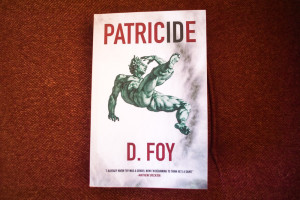Tags
Related Posts
Share This
Revolting
In 2016, James Reich, chairman of the Creative Writing and Literature Department, launched his independent publishing house, Stalking Horse Press, which specializes in the “spiky, angular, errant” and seeks work that “engages with the world.” As a writer with “avant garde tendencies,” Reich has sympathy for writers whose work has difficulty finding a place in mainstream literary publishing. His three books I, Judas, Bombshell, and Mistah Kurtz! each play with the idea of what is “mainstream” and “canon,” air quotes for emphasis. Though his books found a home in Soft Skull Press and Anti-Oedipus Press, Stalking Horse Press represents an “opportunity to give something back…to help people…who have a great manuscript but are finding it difficult to find a publisher willing to take a risk on it.”
Reich is not treating his press like a traditional publishing house, a choice which is integral to his vision. His influences include Maurice Girodias of Olympia Press, Barney Rosset of Grove Press, and Lawrence Ferlinghetti of City Lights, all people who “fought the battles with censorship” to give writers today freedom to write what they will, people who never became rich through their publishing houses but nonetheless shaped our literary world. “I want to help other writers and improve the state of literature by making sure worthy types of writing or individual books don’t get lost in the frenzy to earn money,” he says of his mindset. “I don’t want to get caught up in Lit Biz™.”

James Reich, chairman of the Creative Writing and Literature Department at Santa Fe University of Art and Design, aims to utilize his publishing press to give worthy writers who may otherwise be unfairly overlooked the chance to be published. Photo by Jennifer Rapinchuk
Much like saying “Hollywood” refers to a business practice rather than a physical location, Lit Biz™, or the literary business for the un-indoctrinated, describes a business practice prone to taking fewer risks with writers and subject matter and prone to shifting values. It’s a real concern that a self-conscious publisher will lean toward “safe” choices, such as taking on a writer with a large social media following over someone without didn’t, even if the writer with a smaller following or no following at all happens to be more qualified. Once upon a time, publishers would find and create an audience for a new writer, but modern practice expects a writer to bring an audience to the publisher. It’s a practice that does not appeal to Reich. “[It is] completely retrograde and an inversion of the way things used to be where a publisher seeks an audience for the writer,” he explains. “It’s not [a writer’s job] to bring an audience.” Previously, a publisher would use a publicist and create a strategy to bring an author to the public eye. Reich likens this to if an East Coast band traveled to the West Coast, and a club promoter on the West Coast refused to book the band unless it could bring an audience to the club. The club’s reputation, or the publisher’s reputation, should be trustworthy, so that the public knows that their authors are worthy of their time and money. Reich fears that the increased emphasis on social media presence makes writers too self-conscious online, discouraging discourse on anything not craft-related. Afraid of being perceived as “too political,” writers may look inward rather than outward when engaging on the Internet.

D. Foy’s “Patricide” was the first book published by James Reich’s Stalking Horse Press. Photo by Jennifer Rapinchuk
Stalking Horse Press asks that each of its writers choose a charitable organization to donate a portion of proceeds from each book, another way in which the press looks to engage with the outside world. “I feel like that connection between art and culture and society needs to be re-bridged so that we’re not doing all these things for selfish reasons,” he says. “I think the worst thing that can happen to a writer is to get into a sandbox mentality.” Reich is concerned with the effect that writing has on culture and interested in writers who are themselves interested in how they might “use their writing to make… all of our lives better.” He laughs and acknowledges that may sound grandiose, but maintains that writers should have both social and existential positions rather than just academic positions about their craft.
For writers still seeking publication, Reich’s biggest piece of advice is to never quit. “Don’t let the opinion of major publishers or your friends dissuade you.” Every submission brings you closer to success. “If you don’t enter the game,” Reich pauses, laughs, fights the urge to say ‘win.’ “If you don’t enter the game… you can’t benefit.” For the books that are complex, that can’t be summed up in fewer than 10 sentences, Reich encourages submissions to Stalking Horse Press. “Complexity shouldn’t be the standard for rejection,” he says. “There should be a place for that work.”






 Jackalope Magazine is the student magazine of Santa Fe University of Art and Design. Building on the interdisciplinary nature of our education, we aim to showcase the talent of our university and character of our city.
Jackalope Magazine is the student magazine of Santa Fe University of Art and Design. Building on the interdisciplinary nature of our education, we aim to showcase the talent of our university and character of our city.
0 Comments
Trackbacks/Pingbacks